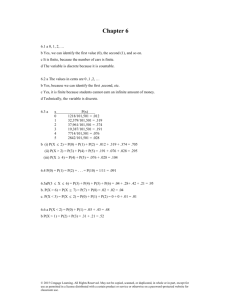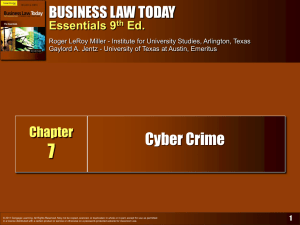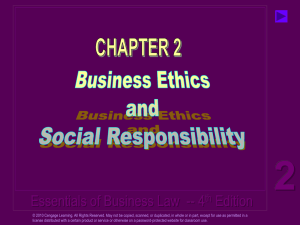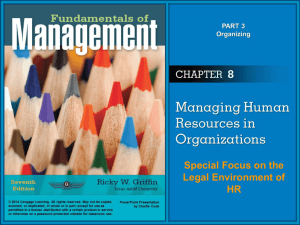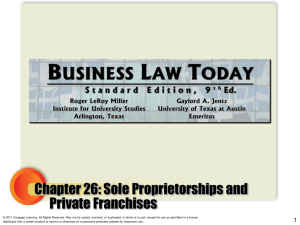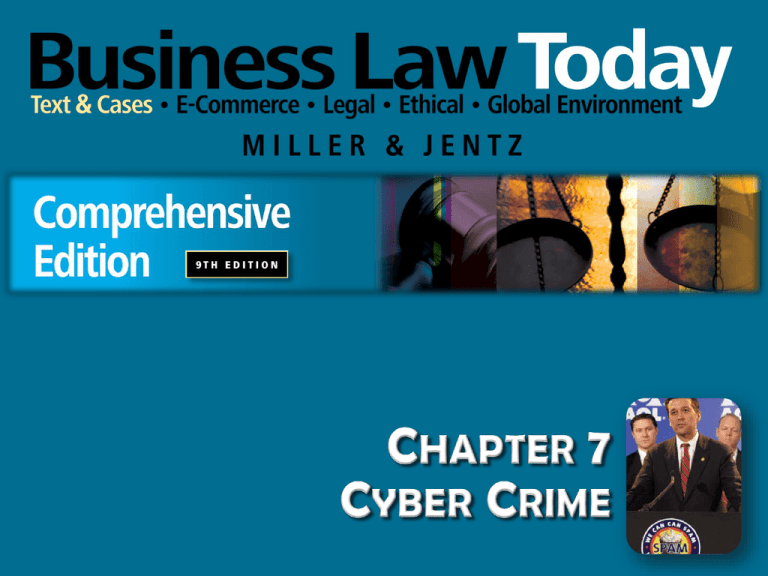
• What distinguishes cyber crime from
“traditional” crime?
• How has the Internet expanded
opportunities for identity theft?
• What are three reasons that
cyberstalking may be more
commonplace than physical stalking?
© 2012 Cengage Learning. All Rights Reserved. May not be copied, scanned, or duplicated, in whole or in part, except for use as
permitted in a license distributed with a certain product or service or otherwise on a password-protected website for classroom use.
2
• What are three major reasons that
the Internet is conducive to juvenile
cyber crime?
• How do encryption programs protect
digital data from unauthorized
access?
© 2012 Cengage Learning. All Rights Reserved. May not be copied, scanned, or duplicated, in whole or in part, except for use as
permitted in a license distributed with a certain product or service or otherwise on a password-protected website for classroom use.
3
• Computer crime: “any violation of
criminal law that involves knowledge of
computer technology for [its]
perpetration, investigation, or
prosecution.” Three categories:
–Computer is the object of a crime.
–Computer is the subject of a crime.
–Computer is the instrument of a crime.
© 2012 Cengage Learning. All Rights Reserved. May not be copied, scanned, or duplicated, in whole or in part, except for use as
permitted in a license distributed with a certain product or service or otherwise on a password-protected website for classroom use.
4
• Cyber Consumer Fraud: Any act
directed against computers or that
uses computers as an instrumentality
of a crime.
–Online Auction Fraud.
–Online Retail Fraud.
© 2012 Cengage Learning. All Rights Reserved. May not be copied, scanned, or duplicated, in whole or in part, except for use as
permitted in a license distributed with a certain product or service or otherwise on a password-protected website for classroom use.
5
• Cyber Consumer Fraud (cont’d).
–Cyber Theft.
• Identity Theft.
• Phishing.
• Vishing.
• Employment Fraud.
–Cyberstalking.
• Threat of Cyberstalking.
• An Easier Alternative?
© 2012 Cengage Learning. All Rights Reserved. May not be copied, scanned, or duplicated, in whole or in part, except for use as
permitted in a license distributed with a certain product or service or otherwise on a password-protected website for classroom use.
6
• Cyber Consumer Fraud (cont’d).
–Cyberstalking (cont’d).
• Cyberstalking on Social Networks.
• CASE 7.1 State v. Cline (2008). What
were the court’s reasons for venue?
© 2012 Cengage Learning. All Rights Reserved. May not be copied, scanned, or duplicated, in whole or in part, except for use as
permitted in a license distributed with a certain product or service or otherwise on a password-protected website for classroom use.
7
• Credit-Card Crime.
• Hackers.
–The Scope of the Problem.
–Juvenile Cybercrime.
• New Service-Based Hacking at Low
Cost.
• Cyberterrorism.
© 2012 Cengage Learning. All Rights Reserved. May not be copied, scanned, or duplicated, in whole or in part, except for use as
permitted in a license distributed with a certain product or service or otherwise on a password-protected website for classroom use.
8
• Pirating Intellectual Property Online.
–Business Software Alliance estimates
35% of software is pirated, with losses
exceeding $5 billion/year.
–The Grokster case.
© 2012 Cengage Learning. All Rights Reserved. May not be copied, scanned, or duplicated, in whole or in part, except for use as
permitted in a license distributed with a certain product or service or otherwise on a password-protected website for classroom use.
9
• State Regulation of Spam.
• The Federal CAN-SPAM Act.
• The U.S. Safe Web Act.
–Allows the FTC to share information
with foreign governments, and to
jointly investigate and prosecute
internet fraud.
© 2012 Cengage Learning. All Rights Reserved. May not be copied, scanned, or duplicated, in whole or in part, except for use as
permitted in a license distributed with a certain product or service or otherwise on a password-protected website for classroom use.
10
• Generally, gambling is illegal and assets
from gambling can be seized.
– CASE 7.2 United States v. $6,976,934.65, Plus
Interest, Deposited into Royal Bank of
Scotland International (2009). What right
does the United States have to forfeit funds
located in another country?
• In 2006, Congress passed the Unlawful
Internet Gambling Enforcement Act.
© 2012 Cengage Learning. All Rights Reserved. May not be copied, scanned, or duplicated, in whole or in part, except for use as
permitted in a license distributed with a certain product or service or otherwise on a password-protected website for classroom use.
11
• Prosecution of Cyber Crime.
–“Location” of crime is an issue.
–Jurisdiction of courts is an issue.
• Computer Fraud and Abuse Act.
–Person is liable if he accesses a
computer online, without authority, to
obtain classified, private, or protected
information.
© 2012 Cengage Learning. All Rights Reserved. May not be copied, scanned, or duplicated, in whole or in part, except for use as
permitted in a license distributed with a certain product or service or otherwise on a password-protected website for classroom use.
12
• Private Efforts to Combat Cyber
Crime.
–Firewalls and Antivirus software.
–Encryption is another means to secure
data.
© 2012 Cengage Learning. All Rights Reserved. May not be copied, scanned, or duplicated, in whole or in part, except for use as
permitted in a license distributed with a certain product or service or otherwise on a password-protected website for classroom use.
13


